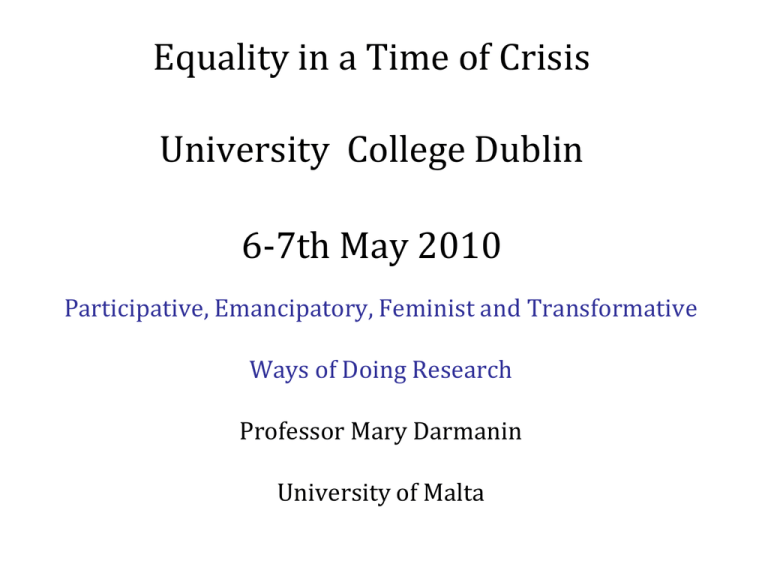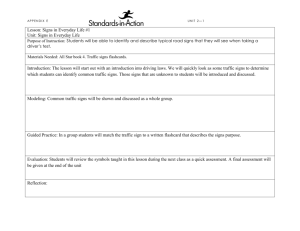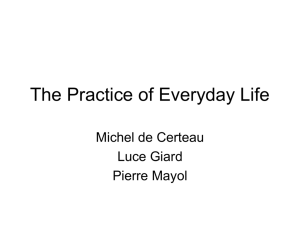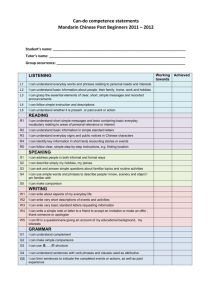MaryDarmanin_PEFT Research
advertisement

Equality in a Time of Crisis University College Dublin 6-7th May 2010 Participative, Emancipatory, Feminist and Transformative Ways of Doing Research Professor Mary Darmanin University of Malta Crisis and universities • supposed ‘knowledge societies’ • global asymmetries of knowledge • expertocracy • mediocracy • corpocracy • technocracy 2 Responses outside PEFT • praxis and political theory – Dallmayer • the research imagination and the ‘right to research’ – Appadurai • from maldistribution and misrecognition to representation-reframing disputes about justice- Fraser • cosmopolitanism - Appiah 3 Methodology Sandra Harding’s (1987) distinction between • method- techniques for gathering empirical research • methodology – the theory of knowledge and the interpretative framework that guides a particular project 4 an ontology, or theory of life • • • • • • • • world as socially determined that can be described rejecting binaries of self-and society power and its capacity to hide its hand (s) identity-neither fixed nor singular inscribed in discourses (social relations) embodied intersectional 5 Intersectionality We regard the concept of ‘intersectionality’ as signifying the complex, irreducible, varied, and variable effects which ensue when multiple axis of differentiationeconomic, political, cultural, psychic, subjective and experiential-intersect in historically specific contexts. Brah, A. and A. Phoenix (2004) religion dis/able-bodiedness age ‘race’ citizenship and so on ……. sexual orientation language gender social class additive or constitutive? 7 Interconnectedness of human life – an ontological sociality • multiplicity of social relations • across all spatial scales • spatial inequality • spatial identities-places, regions, nations • not naturally given • historically changing ‘overlapping communities of fate’ & ‘global covenant’ (Held, 2004) ‘cosmopolitanism- responsibilities’ Appiah, 2006 8 Volcanic ash cost Malta €10m and 90,000 bed nights 9 D. Smith (1987) The everyday world as problematic Directs us to • ‘embodied’ subject located in particular local historical setting • ‘everyday life’ constituted as our problematic • preserves presence of subjects as knowers and actors, from where they stand • in determinate relations with those whose relations we intend to express • but not rely on them for understanding of social relations that shape and determine the everyday, by being restricted to the descriptive- move to interpretative and analytic 10 Who speaks with whom? • • • • • a. b. c. ‘Who speaks for whom?’ about power The shift in social balance of power begins from a position of differential power Social research political- how we use our privilege for social ends A politics of involvement- who speaks with whom? Representation as a political act- not essentialised or naturalised but from history as members of marginalised group not to lead to hierarchies of oppression create solidarity not barriers of difference COMMONALITY more than DIFFERENCE 11 Study power across levels of analysis 1. 2. 3. Unit of analysis systemic, even if unit of data collection is particular slice, group, person, event or part of whole. Including persons who benefit from social arrangements or merely ‘watch’. Task to theorize across levels, interrogate movement of power across levels, social relations . ‘no unit too small to see fingerprint of the world’ 12 Dialogue and Imagination Dialogical practice • which transforms situated experience into situated knowledge Imagination • To produce other types of knowledge that are valuable 13 Theory of knowledge/epistemology • • • • • • • • Everyday world as problematic Standpoint theory/ positionality Ethical Does not erase Other Reveals social relations – not a perspectivalism Includes practical engagement -praxis Normative issues Leading to change ‘an ontological epistemology of participation’ A. K. Giri, 2006 14 Methods • That methods, including of analysis, should ‘reflect the forms of social life’ • Multi-method - where qualitative and quantitative intellectually and politically compatible. • But ‘overcoming expediency’ 15 Where to start ? • Unbearable oppression • A tomato 16 • amplifies demands and critiques from the ‘margins’ • elaborates alternate possibilities for justice • signifies a fundamental right to ask, investigate, dissent and demand what could be • shatters ‘lying world of consistency’ • makes public ‘private ‘ troubles • reveals common social roots of these ‘private’ troubles • demonstrates differentiated consequences of social oppression distributed unevenly • privileges perspectives ‘that age on the bottom of social arrangements’ 17 Fine and Torre, 2006 illustrative cases 1. Opportunity Gap Research Projecturban and suburban youths’ experiences of racial & class justice & injustice in their New York City schools (Fine et al, 2005) 2. College-in-prison programme for women in a maximum security prison, New York (Fine and Torre, 2006) 3. Youth-focused initiatives in Dadaab Refugee Camps of NE Province, Kenya ( Cooper, 2005) 18 Methods and processes Opportunity Gap Project • 2 day research camps- method and critical race theory • prepared survey on school community & trust & civic engagement • transcripts of all seniors tracked in AP/honours course • feedback to 8 school sites College in Prison• ‘methods’ camp, local history of struggle, social, feminist, critical race theory & methodology • craft research questions • 9-11 am sessions community of learners/community of researchers • multi-method, multi-site, multi-generational • focus group with current students and drop-outs; 20 interviews those outside • survey Faculty and administrators • archival research • focus group with children of prisoners • 36 month long recidivism data stratified by those in College and those not. Dadaab Refugees• 2 day methods’ workshop for 11 youth researchers • meetings, focus group discussions on interview guide • each prepared analysis summary • they interviewed 140 others, chosen by themselves • report; practice presentation for NGOs, went to Nairobi to present • email of report to other organisations 19 • Full compositional analysis • First fracturing analysis • Contrastive/counter analysis • Local excavation • Policy in practice analysis 20 On the tomato trail • Freirean generative themes • Existential experiences of the everyday • Complex structural conditions of globalisation 21 SHOWeD ‘freewrite’ acronym • • • • • What do you See here? What’s really Happening here? How does this relate to Our lives? Why does this problem (or asset) exist? What can we Do about it? 22 The power of the visual • condenses at once the everyday, the monumental and spectacular • immediate-fugitive moments of life, fugitive testimony, sensation of living presence, ‘salvage ethnography’ • aesthetically engaging (not just analysis) • potential for interrogation to release secrets (can be ‘read’ ) • irreducibility of objects/materiality of culture (not texts about things only) • in the absence of more personal contact- visual, a way in • vantage points from which bodies see objects and vice versa • a ‘truth of the meaning of the object or image’ –realism /verisimilitude ? (but also interpretation) • focus on unnoticed, unrecalled, invisible presence- power relations that structure life including space, commodities etc. • spatial practices and representational spaces, as well as representation of space 23 24 hyperlink cinema as a model for PEFT research? works through narratives works through juxtaposition/contrast works through oblique but justifiable global links is about interconnection/responsibility gives embodied account of non-unitary subjects simultaneously, if not knowingly, connected explores social, economic, political, sexual etc power relationships shows how power/love shift – multiple discursive sites uses mise en scene, flash-back and forward to fracture myth of linearity (to question chronological regimes of path dependency) space for agency/salvation visual and aesthetic (music) to heighten response 25 Conclusion 1. Recognise that academy is one of few remaining places in which dissent is possible 2. Injustice is not just a cognitive problem (Fine et al 2006) “To deny someone’s claim that she is in pain is not an intellectual failure, it is a spiritual failure. The future between us is at stake.” Veena Das, 2000 26


